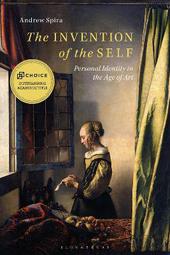
|
The Invention of the Self: Personal Identity in the Age of Art
Paperback / softback
Main Details
| Title |
The Invention of the Self: Personal Identity in the Age of Art
|
| Authors and Contributors |
By (author) Andrew Spira
|
| Physical Properties |
| Format:Paperback / softback | | Pages:424 | | Dimensions(mm): Height 234,Width 156 |
|
| Category/Genre | Philosophy of the mind |
|---|
| ISBN/Barcode |
9781350298170
|
| Classifications | Dewey:126 |
|---|
| Audience | | Professional & Vocational | |
|---|
|
Publishing Details |
| Publisher |
Bloomsbury Publishing PLC
|
| Imprint |
Bloomsbury Academic
|
| Publication Date |
21 April 2022 |
| Publication Country |
United Kingdom
|
Description
This book is an examination of personal identity, exploring both who we think we are, and how we construct the sense of ourselves through art. It proposes that the notion of personal identity is a psycho-social construction that has evolved over many centuries. While this idea has been widely discussed in recent years, Andrew Spira approaches it from a completely new point of view. Rather than relying on the thinking subject's attempts to identify itself consciously and verbally, it focuses on the traces that the self-sense has unconsciously left in the fabric of its environment in the form of non-verbal cultural conventions. Covering a millennium of western European cultural history, it amounts to an 'anthropology of personal identity in the West'. Following a broadly chronological path, Spira traces the self-sense from its emergence from the collectivity of the medieval Church to its consummation in the individualistic concept of artistic genius in the 19th century. In doing so, it aims to bridge a gap that exists between cultural history and philosophy. Regarding cultural history (especially art history), it elicits significances from its material that have been thoroughly overlooked. Regarding philosophy, it highlights the crucial role that material culture plays in the formation of philosophical ideas. It argues that the sense of personal self is as much revealed by cultural conventions - and as a cultural convention - as it is observable to the mind as an object of philosophical enquiry.
Author Biography
Dr. Andrew Spira is Course Leader, Christie's Education London and a curator. He is author of Avant-Garde Icon: Russian Avant-garde Art and the Icon Painting Tradition (2008).
ReviewsIn this radically new history of the self from the Middle Ages through the romantic period, Andrew Spira takes us on a grand tour of the evolving self-consciousness of the artist. Throughout he attends to the entire range of the material and cultural conditions that enabled particular notions of personal creativity to emerge in different historical periods. The Invention of the Self makes it clear that the very notion of the autonomous self, along with our treasured notions of personal identity, are in fact the products of a long historical process. Crossing disciplinary boundaries in stunning ways, this book will be stimulating not only to historians and historians of art but also to students of anthropology, literature, philosophy, and psychology. * John Jeffries Martin, Professor of History, Duke University, USA * 'Through its innovative approach, grand scope and interdisiplinarity, this book offers a rich and exciting discourse that presents the idea of a cultural understanding of the self through the careful study of artefacts. This is a truly fascinating topic approached in a novel way.' * Marya Schechtman, Professor of Philosophy, University of Illinois at Chicago, USA * In The Invention of the Self, Andrew Spira traces the evolution of the self and personal identity, which he sees as having physical, psychological, and social dimensions. His account is beautifully written and extremely erudite. Throughout it, Spira's sensitivity, attention to detail, and understanding of psychological nuance are outstanding. This book deserves to be widely read. * Raymond Martin, Professor Emeritus, University of Maryland College Park, USA * 'This is a magnificent, provocative, and daring book, depicting the changing developments of the sense of Self and its functions, over several millennia. Spira presents a continuous flow of new arguments in which the sense of Self is seen adapting to the ever-changing circumstances of each century. It is an astonishing achievement, marked by range, intelligence and wit. This is a brilliant discursive collection of essays never tangled. Its arguments, discourse and its sentences remain clear and elegant at every point.' * John Milner, Professor of Art, Courtauld Institute of Art, UK *
|